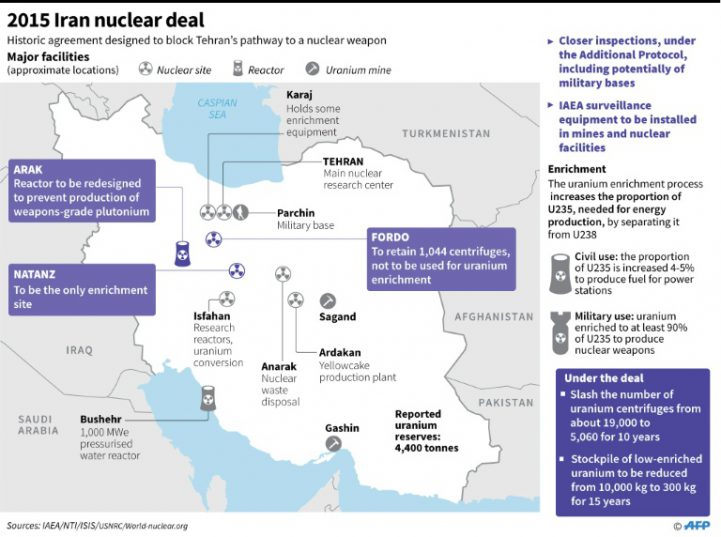Man United late show deepens Man City crisis
Amid already tense US-Iran relations, the US Treasury imposed fresh sanctions, singling out six companies owned or controlled by Shahid Hemmat Industrial Group (SHIG), which it said was central to the Islamic republic’s missile program, freezing their US assets and barring US citizens from dealing with them.
Foreign financial institutions could face punitive measures if they deal with the sanctioned entities, it added.
SHIG was already under UN, US and European Union sanctions.
In a joint statement, Britain, France, Germany and the US condemned Tehran’s “provocative” and “destabilizing” action, saying the test was in violation of United Nations Security Council Resolution 2231.
“We call on Iran not to conduct any further ballistic missile launches and related activities,” they added.
Resolution 2231 was voted at the UN two years ago to endorse the landmark 2015 nuclear deal between Iran, Britain, China, France, Germany, Russia and the United States.
It lifted economic sanctions in exchange for curbs to Tehran’s nuclear program.
The resolution called on Iran not to test ballistic missiles capable of carrying a nuclear warhead and an arms embargo remained in place.

Map and factfile on the 2015 Iran nuclear deal
All four Western countries have written to UN Secretary General Antonio Guterres about their “concerns,” according to the joint statement.
It said the British, French and German governments are discussing the issues in bilateral talks with Iran.
The United States has had no diplomatic ties with the Islamic republic since 1980, and President Donald Trump has halted the direct contacts with Tehran initiated by his predecessor Barack Obama.
– ‘Widespread support for terrorists’ –
At UN headquarters in New York, US envoy Nikki Haley spoke of deep “mistrust” with Iran.
“Iran’s widespread support for terrorists tells us we can’t trust them. Iran’s breaking its obligation on missile testing tells us we can’t trust them. Yesterday’s launch proves that yet again,” she said in a statement.
Despite his electoral promise to tear apart what he once called “the worst deal ever,” Trump has so far respected the tenets of the accord, a diplomatic success of his Democratic predecessor that advanced multilateralism and non-proliferation.
It is, however, unclear that the US administration will continue to certify every three months that Iran is respecting the deal, or keep off economic sanctions linked to the Islamic republic’s nuclear program.
European countries, however, say the nuclear and ballistic issues should be treated separately.
Yet the joint statement noted that Iran’s latest test features technology related to “ballistic missiles designed to be capable of delivering nuclear weapons.”
– Fresh US sanctions –
In unveiling the new US sanctions, Treasury Secretary Steven Mnuchin said they “underscore the United States’ deep concerns with Iran’s continued development and testing of ballistic missiles and other provocative behavior.”
He warned that Washington would “continue to aggressively counter Iran’s ballistic missile-related activity, whether it be a provocative space launch, its development of threatening ballistic missile systems, or likely support to Yemeni Huthi missile attacks on Saudi Arabia such as occurred this past weekend.”
According to the Treasury, “space launch vehicles use technologies that are closely related to those of an intercontinental ballistic missile and this launch represents a threatening step by Iran.”
Iranian state television broadcast footage of the takeoff from the Imam Khomeini space center, named after the late founder of the Islamic republic, in Semnan province in the east of the country.
The report said the launch vehicle, named Simorgh after a bird in Iranian mythology, was capable of propelling a satellite weighing 550 pounds (250 kilograms) to an altitude of 300 miles (500 kilometers) above earth.
Western states suspect Iran of developing the technology capable of launching long-range ballistic missiles with conventional or nuclear payloads, a charge denied by Tehran, which insists its space program has purely peaceful aims.
Tensions have mounted between Washington and Tehran since US President Donald Trump took office six months ago.
Download our app and read this and other great stories on the move. Available for Android and iOS.